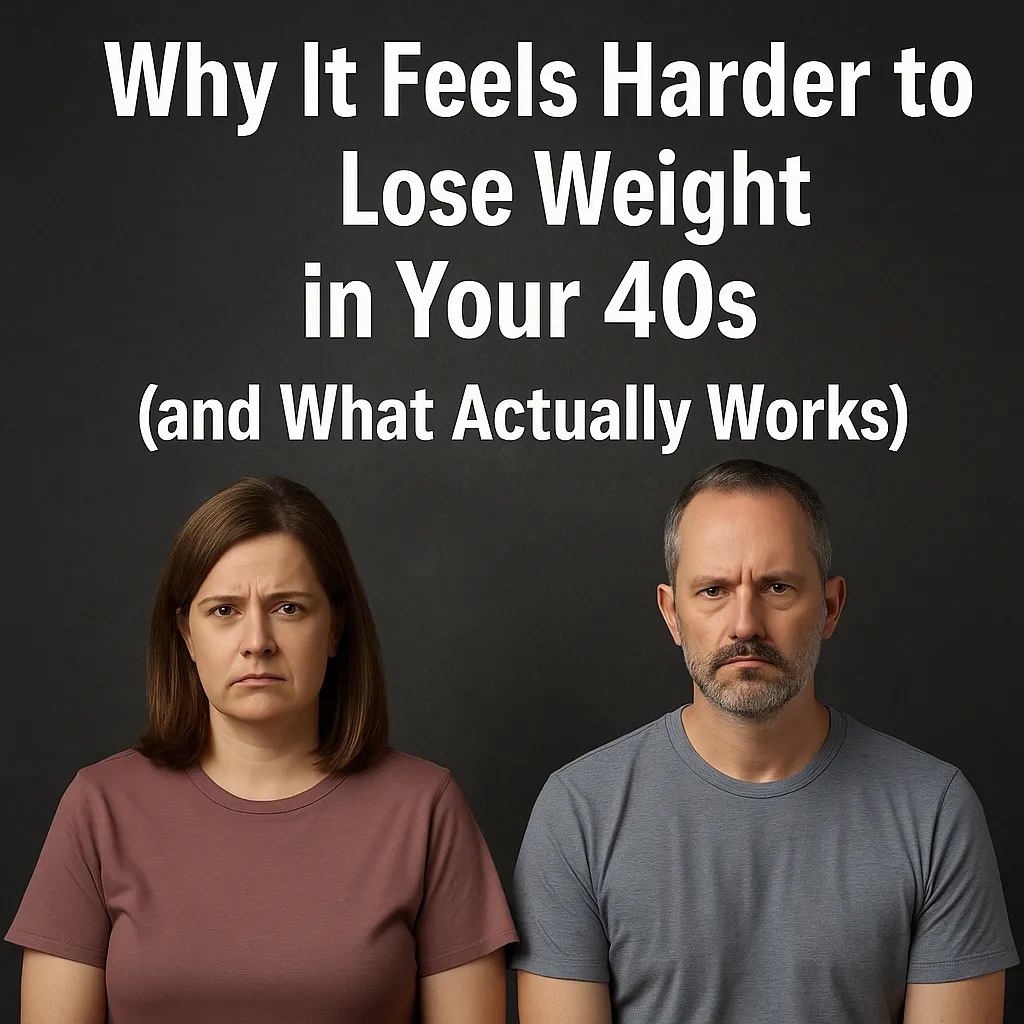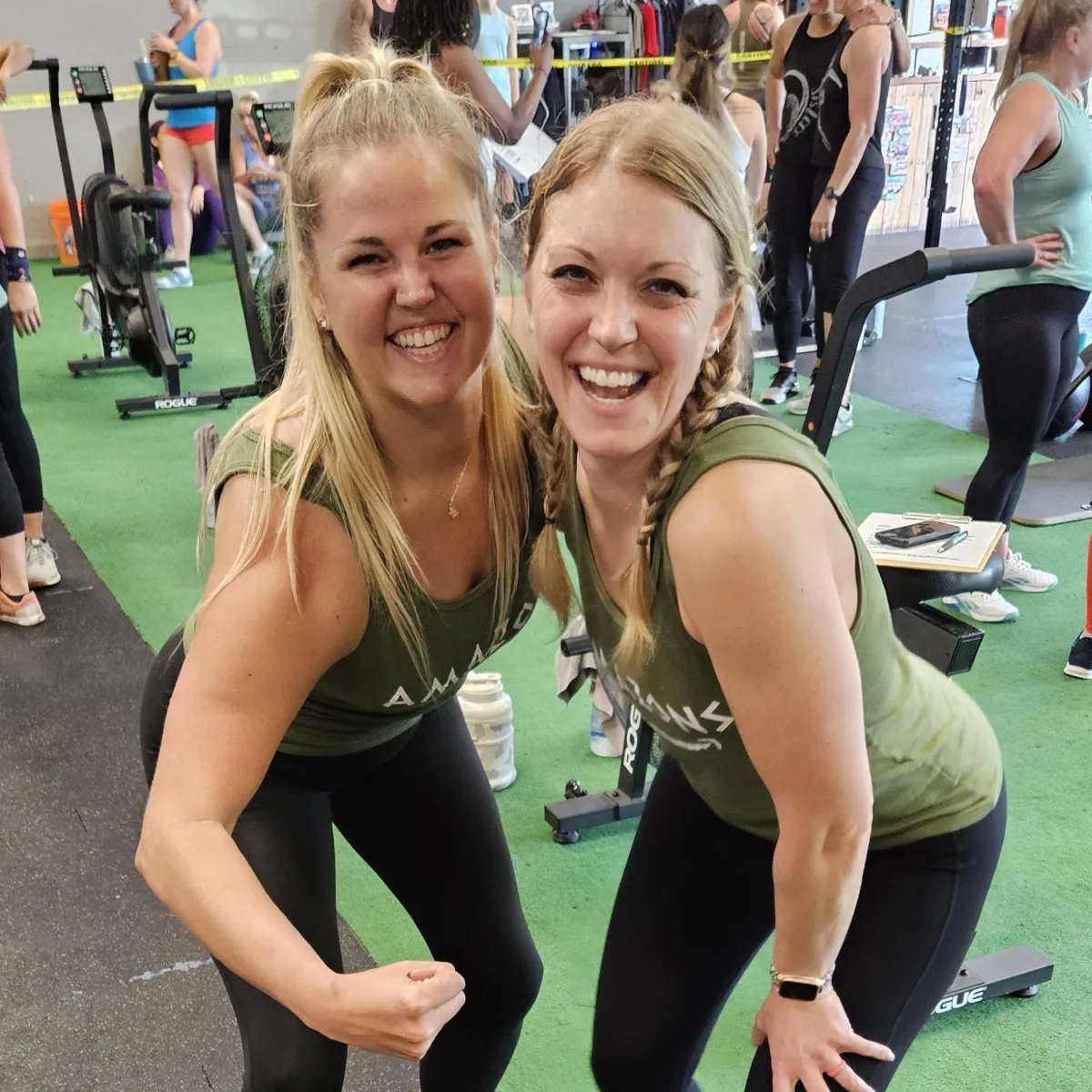WEIGHT LOSS & FITNESS BLOG

Why It Feels Harder to Lose Weight in Your 40s (and What Actually Works)
Why It Feels Harder to Lose Weight in Your 40s (Men & Women)
Have you noticed that the diets and workouts that used to work just don’t anymore? Around age 40, many people—especially those balancing careers, family, and self-care—feel like progress has stalled. Here’s a science-backed breakdown of why, and exactly what to do to turn it around. I won't just tell you about it. I'll give you some actionable steps to live your life in a way that helps.
1. Muscle Loss Starts Early, but Metabolism Stays Strong
Muscle mass declines by approximately 3–8% per decade after your 30s due to reduced protein synthesis, inactivity, and hormonal shifts [1][2]. Since muscle tissue burns more calories at rest than fat, losing it lowers your daily energy expenditure. However, basal metabolic rate (BMR)—the number of calories your body burns at rest—remains steady from your 20s through your 50s. It only begins to decline significantly after age 60, and even then, by less than 1% per year [3][4][5]. In other words, in your 40s, it’s not your metabolism slowing down—it’s often a loss of muscle that’s the real culprit. We all need to be lifting weights. At a minimum of 2x per week. Here's the kicker, you can use almost any rep range. You just need to make sure the final 2-3 reps are really challenging. That's where you can get change to the muscle for the better. Can it harder? Sure. Are there other methods? Sure. But let's keep it simple.
2. Hormonal Shifts Affect Fat, Hunger & Energy
Women entering perimenopause in their 40s often experience fluctuating estrogen levels, which can increase abdominal fat storage, disrupt sleep, and heighten cravings. For men, a gradual decline in testosterone also affects energy levels, fat distribution, and lean muscle mass. Additionally, both sexes experience elevated cortisol levels during this decade—driven by chronic stress—which promotes belly fat and worsens hunger and recovery [6]. Don't worry, I have answers to this later.
3. Life Stress, Less Recovery, and Diet Burnout
The 40s are often your busiest and most stressful decade. Whether it’s advancing in your career, raising kids, managing a household, or caring for aging parents, life in your 40s often results in less sleep, more stress, and very little time for self-care. These factors disrupt hormones, increase cravings, and reduce your ability to recover from workouts. And if you’ve been dieting on and off for years, you may be dealing with “diet fatigue.” Your body might be more resistant to traditional weight-loss strategies because of chronic under-eating, metabolic adaptation, or poor nutrient quality.
What Can I Do When All These Things Happen Naturally?
Muscle Loss Strength train 2–4×/week to preserve/build lean mass. Support this with adequate protein (≥1.2 g/kg/day). Make sure you have 1-2 palm sized servings of protein at every meal. Ideally 3 meals per day. Sufficient recovery after workouts means you shouldn't feel totally wiped out at every workout after your first of the week. Don't choose 15 exercises every workout. Make sure you move throughout the day. Don't forget micronutrients like vitamin D. Get in the sun and eat veggies and fruit. [7][8].
Metabolism Maintain muscle mass and activity to keep your BMR stable. Research shows BMR remains largely unchanged until about age 60 [3][4][5]. The more muscle you lose, the more this could potentially be affected. So, make sure to re-read #1.
Hormone-Driven Fat Gain Manage stress with sleep, movement, and daily routines. Prioritize strength over cardio, eat balanced meals, and improve sleep quality. If you can't do all of this, focus on sleep first, then strength training. Don't allow the list of "should do's" to stress you out more than help you.
Time & Stress Keep workouts short but effective. 30–45 minutes, 3–4 times per week, focusing on compound movements and quality over quantity. On days where you have more time and you feel great, workout longer. Just take inventory of how that affects the rest of your week.
Diet Burnout Shift from restriction to fueling. Use the plate method to eat balanced meals without tracking calories, and focus on sustainable habits over short-term weight loss. Make every plate half veggies, 1/4 protein, and 1/4 non-starchy carbs. Ideally, all whole foods based (this helps with micronutrients like I mentioned before).
Final Takeaway
If weight loss feels harder in your 40s, that’s because your body and your lifestyle have changed—not because your metabolism is broken. While muscle decline starts in your 30s, your metabolism itself stays strong well into your 50s and 60s. The key is to shift from high-intensity quick fixes to sustainable strength, recovery, and lifestyle alignment. When you do that, weight loss becomes less frustrating—and much more achievable.
Need a plan that works for your 40s (and real life)?
At Breakaway Fitness & Performance, we specialize in coaching busy adults through this exact season of life. If you’re ready to stop starting over, click here to schedule a free No Sweat Intro.
Let’s make this time different.
References
Walston JD. Sarcopenia in older adults. Curr Opin Rheumatol. 2012;24(6):623-627. doi:10.1097/BOR.0b013e328358d59b
Narici MV, Maffulli N. Sarcopenia: characteristics, mechanisms and functional significance. Br Med Bull. 2010;95:139-159. doi:10.1093/bmb/ldq008
Pontzer H, et al. Daily energy expenditure through the human life course. Science. 2021 Aug 13;373(6556):808-812. doi:10.1126/science.abe5017
Hall KD, et al. Energy expenditure and body composition changes after an isocaloric ketogenic diet in overweight and obese men. Am J Clin Nutr. 2016;104(2):324–333. doi:10.3945/ajcn.116.133561
Manini TM. Energy expenditure and aging. Ageing Res Rev. 2010 Jan;9(1):1-11. doi:10.1016/j.arr.2009.08.002
Kirschbaum C, et al. Impact of gender, menstrual cycle phase, and oral contraceptives on the activity of the hypothalamus-pituitary-adrenal axis. Psychosom Med. 1999;61(2):154-162.
Deutz NE, et al. Protein intake and exercise for optimal muscle function with aging: Recommendations from the ESPEN Expert Group. Clin Nutr. 2014;33(6):929-936. doi:10.1016/j.clnu.2014.04.007
Liao CD, et al. Effects of protein supplementation combined with resistance exercise on body composition and physical function in older adults. J Am Med Dir Assoc. 2018;19(2):118.e1-118.e10. doi:10.1016/j.jamda.2017.10.024


Are you Ready to become
sTRONG - FIT - cONFIDENT?
Click the Button To Start Your Journey Today!!

